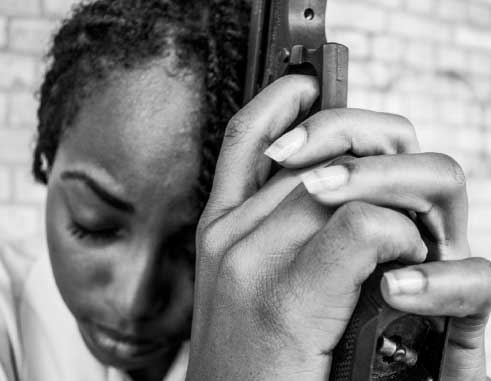By The Rev. Dr. Sonia Hinds
THE pictures by Omar Frederick, a young Anglican at Holy Trinity parish in Castries, invited me to recall how our youngest sister spent her last days on this earth.
Last October, the same month that she would have celebrated her 49th birthday, she ingested a poisonous substance that proved to be fatal. She had been coping with mental illness for almost two decades and one morning last October it seemed as if she decided that it was taking too much from her to keep holding on to life with all its challenges. She let go of the pain and heartache that comes with living with a mental illness, leaving behind a gifted and handsome son whom she loved dearly.
Although she had stopped attending regularly the Anglican Church after receiving the Sacrament of Confirmation, our sister believed in God and was deeply spiritual. While on her earthly journey, she searched for religious meaning and at one time showed interest in the Jewish religion. In all of her poems and her reflections on life, and almost all the books she read, the theme of God and God’s goodness prevailed. In some, she questioned God and often used the Psalms as guides to write many of her poems. She published two books, thanks to a local printing company who had never published before her request. Her funeral service was held at the same church where she was confirmed over thirty years ago. Maybe someone wondered whether the service should have taken place there. A couple of years earlier after my friend’s sister died by hanging herself, there was a deafening silence from her church leaders when I inquired of a funeral service and to this day, I am not aware that a funeral service was held in the church.
For many years, the Christian Church has struggled with how to view suicide. Saint Thomas Aquinas, one of the early Church leaders who strongly influenced the Christian Church’s teachings, believed that suicide, by excluding a final repentance, was a mortal sin. This is mainly because he believed that suicide was freely chosen and an uncoerced action engaged in for the purpose of bringing one’s own death. For them, it is as if the gift of life, freely given by God, was not taken with gratitude. It is as if by taking one’s life, the Church contended, one is rejecting God and God’s goodness.
Thankfully, many in the Christian Church have moved from defining it as a free choice and have asked some serious questions: Was it free choice? Could physical or emotional pain be so intense that the individual might have understood that there is another way of dealing with this? What about those who were caught just in time and then we learn that it may have been a cry for help?
As we continue to observe Suicide Prevention Month in St Lucia, I commend those who have brought this awareness to the society. It gives us in the Christian Church an excellent opportunity to think of ways of how we can be part of the solution. I offer three.
First, we can pray for those who have thought of, attempted and those who died by suicide. Although we believe in life after death, we also believe in abundant life in the here and now. Our prayers are to a compassionate God who knows intimately of pain and suffering as the gospels so vividly tells us. We must continue to believe that our intercessory prayers can make a difference
Secondly, our prayers must move us to action. We can listen in a non-judgmental manner to those who are complaining, experiencing loss, or who might just be in need of a listening ear. We have to desist from judging those who attempted or those who took their own lives. Unfortunately there are still too many in the Christian Church who believe that persons who die at their own hands have committed a sin and will go to hell. This does not help those who are in need of a compassionate ear.
Our actions may also include working in partnership with agencies or organizations that are already addressing this pressing concern and its related issues. Churches must step out of their denomination and work together, with other faith-based groups and collaborate with other agencies such as the Crisis Centre.
Finally, let us assure the loved ones, especially the children who remain, that God loves them. We may not know what it is to be the child of someone who took that fatal step but here is an opportunity to share God’s love. It is at this time that the Christian Church can respond in practical ways and demonstrate the love of Jesus.
The pictures by Omar, a young Christian man, capture the face of suicide and are a call to prayer and action. For if it is true that there are persons among us and who may even be attending church with us are considering suicide, we have to find ways that we can support them and possibly prevent one more suicide. It is too late for our sister but not possibly for those who are among us now. May God give us the strength to act now.






![Simón Bolívar - Liberator of the Americas [Photo credit: Venezuelan Embassy]](https://thevoiceslu.com/wp-content/uploads/2025/12/Simon-Bolivar-feat-2-380x250.jpg)



